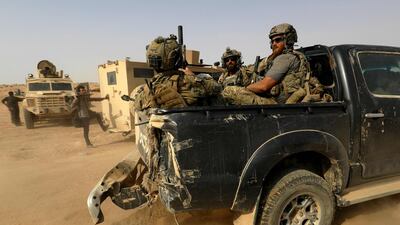Kurdish-led forces seized the town of Hajin from ISIS on Friday in a major victory for the US-backed operation to eradicate the extremists from eastern Syria.
The Syrian Democratic Forces secured Hajin, the largest settlement in what is the last pocket of territory controlled by ISIS, the Syrian Observatory for Human Rights said.
"After a week of heavy fighting and air strikes, the SDF were able to kick ISIS out of Hajin," said Rami Abdel Rahman, the head of the Britain-based monitoring organisation.
The operation was completed at dawn, a day after SDF forces fanned out across the town in the Euphrates valley, he said.
A source in the YPG Kurdish militia told Reuters the SDF was in control of Hajin, but small pockets of ISIS resistance remained that would be cleared in the next day or two.
On Thursday, the last ISIS fighters were confined to a network of tunnels and the edges of Hajin, which lies in the eastern province of Deir Ezzor, about 30 kilometres from the border with Iraq.
The area held by ISIS is sometimes referred to as the "Hajin pocket", the last rump of a once-sprawling "caliphate" the group proclaimed in 2014 over swathes of Syria and Iraq.
ISIS fighters pulled back to positions east of Hajin on Friday and to Sousa and Al Shaafa, the two main villages in their shrinking Euphrates valley enclave.
As recently as Thursday, the group posted pictures of fighting in Hajin on its social media accounts.
SDF commander-in-chief Mazloum Kobani told Reuters on Thursday that there were at least 5,000 ISIS fighters in the pocket of territory including Hajin and that they had decided to fight to the death. This included about 2,000 foreign fighters, mostly Arabs and Europeans along with their families.
Mr Kobani also said it was possible that ISIS leader Abu Bakr Al Baghdadi was in eastern Syria, but the SDF could not be sure because he often disappears.
_______________
Read more:
US warns Turkey against unilateral military action in Syria
Hundreds of bodies found in mass graves near ISIS’s former Syrian stronghold
UN: ISIS carrying out executions in east Syria
_______________
According to Mr Abdel Rahman, a total of 17,000 fighters from the Kurdish-Arab SDF alliance are involved in the operation to flush ISIS out of its last bastion.
The operation was launched on September 10 and has taken a heavy toll, according to figures collected by the Observatory, which has a vast network of sources on the ground.
At least 900 extremists and 500 SDF fighters were killed in the fighting, the monitoring group said.
According to Mr Abdel Rahman, more than 320 civilians were also killed, many of them in air strikes by the US-led coalition.
US President Donald Trump this week predicted the extremist group would be fully defeated within a month.
"We've done a very, very major job on ISIS," he said on Tuesday.
"There are very few of them left in that area of the world. And within another 30 days, there won't be any of them left."
Western and other officials have repeatedly announced deadlines for a final victory over ISIS but the group is proving resilient.
The push to retake Hajin was delayed by Turkish threats on the Kurdish heartland further north and deadly counter-attacks by die-hard extremists making a bloody last stand.
"ISIS anticipated its battlefield defeat and the loss of the caliphate and prepared accordingly," said Bruce Hoffman, a terrorism expert at Georgetown University in Washington.
Besides what is left of the pocket near Hajin in the Euphrates valley, ISIS has a presence in Syria's vast Badia desert, a front which is managed by Russian-backed government forces.
The group also has sleeper cells across Iraq and Syria that regularly carry out attacks.
The loss of Hajin came hours after the ISIS propaganda outlet Amaq claimed responsibility for a Christmas market shooting in the French city of Strasbourg.
The Amaq statement was posted just after the shooter Cherif Chekatt was gunned down by police but bore the hallmarks of an opportunistic claim by ISIS.

